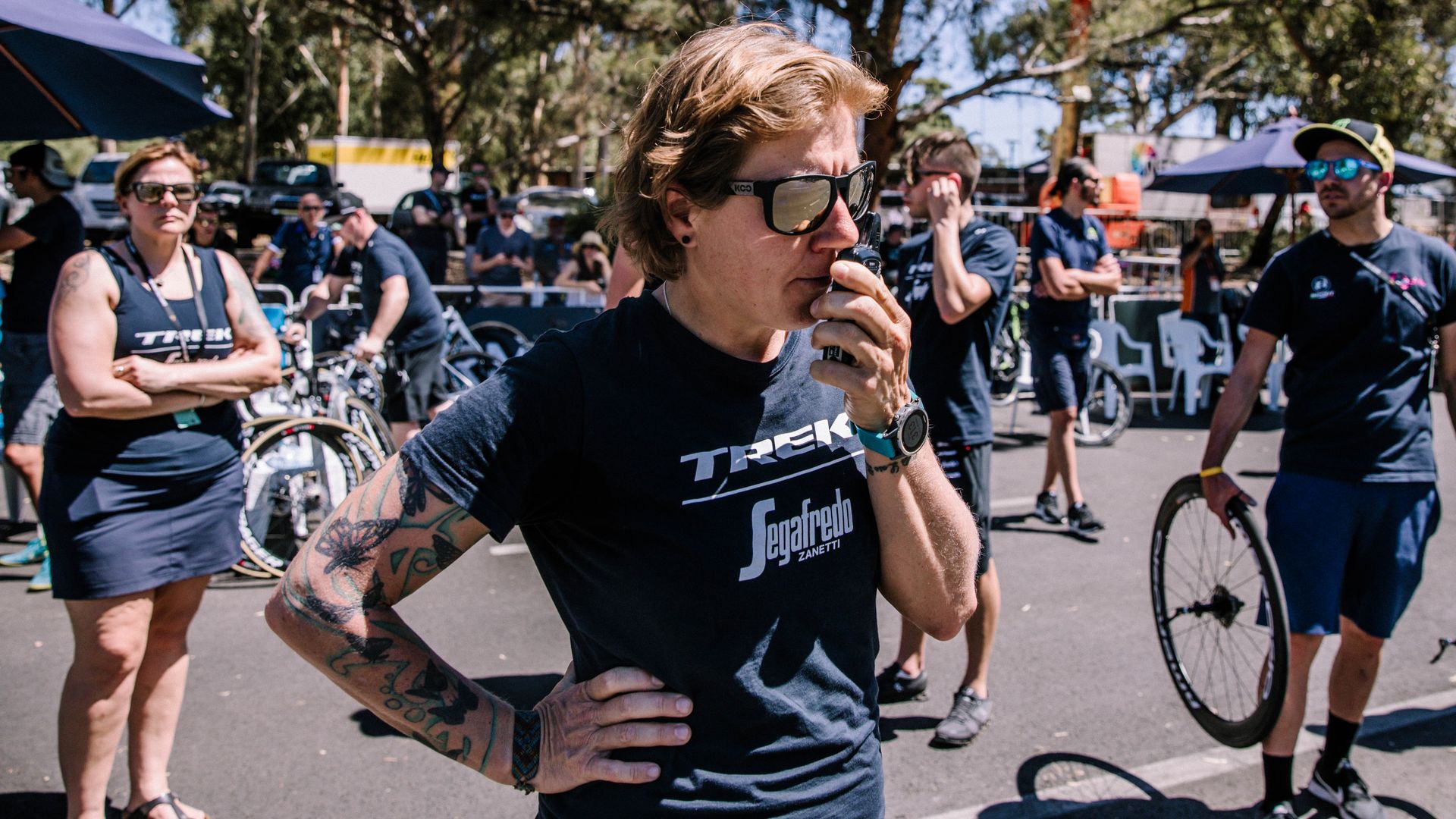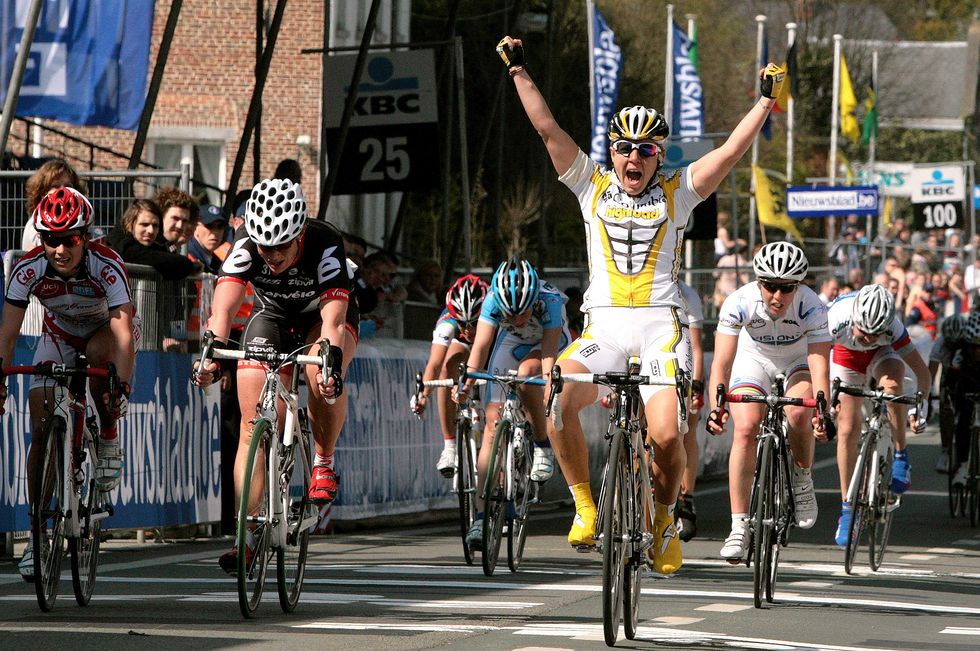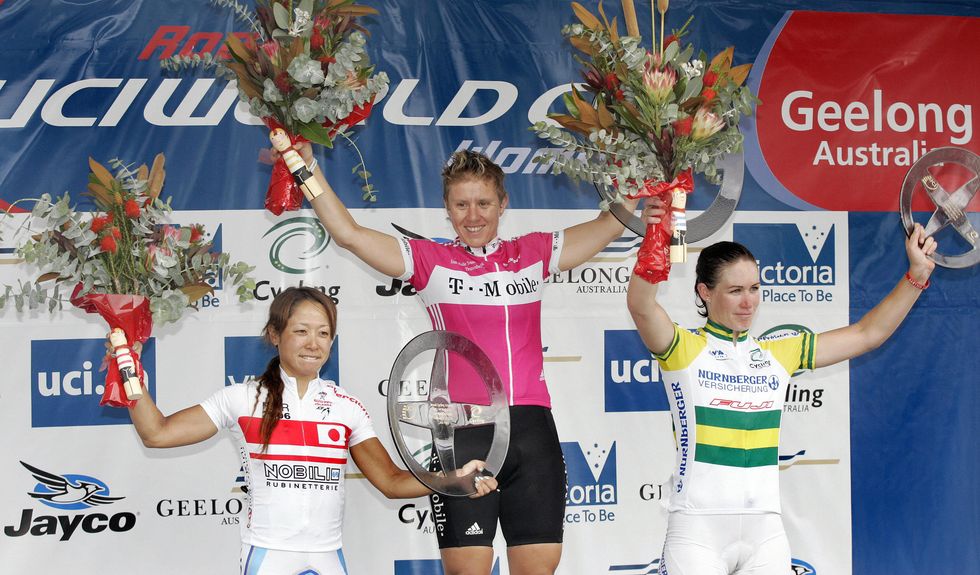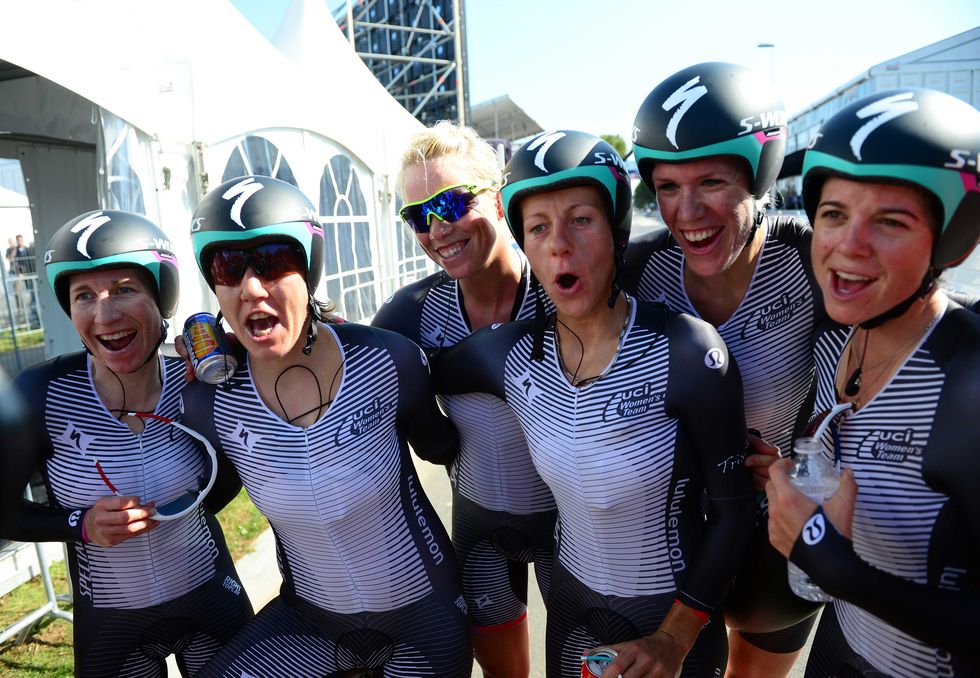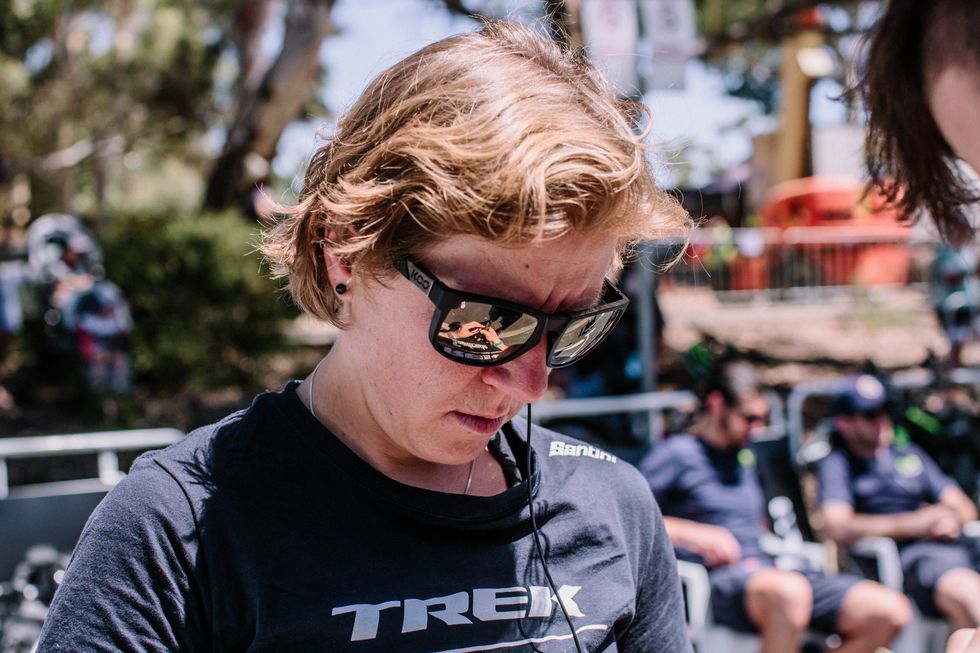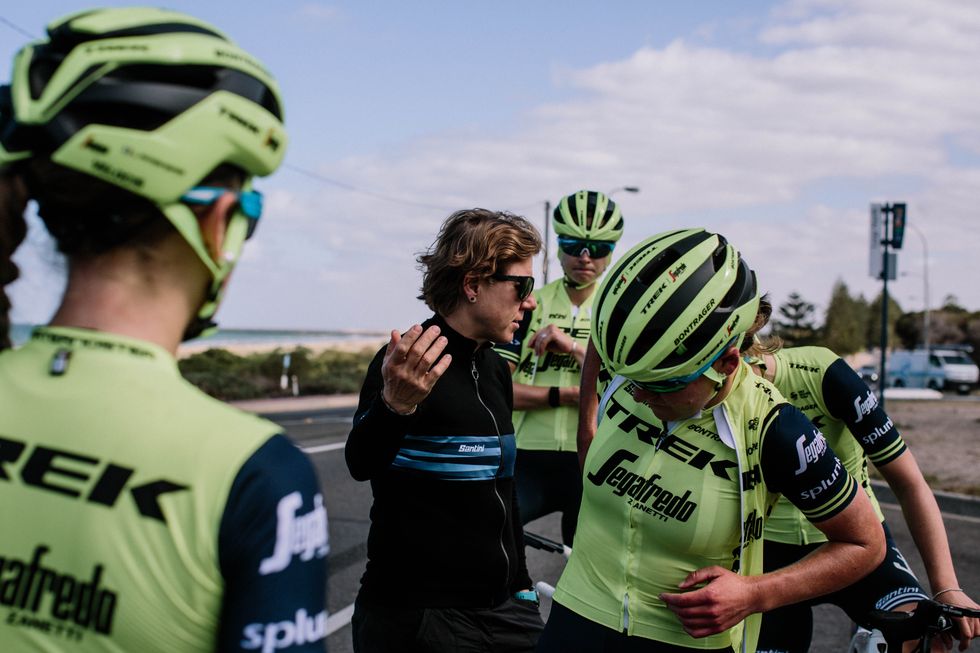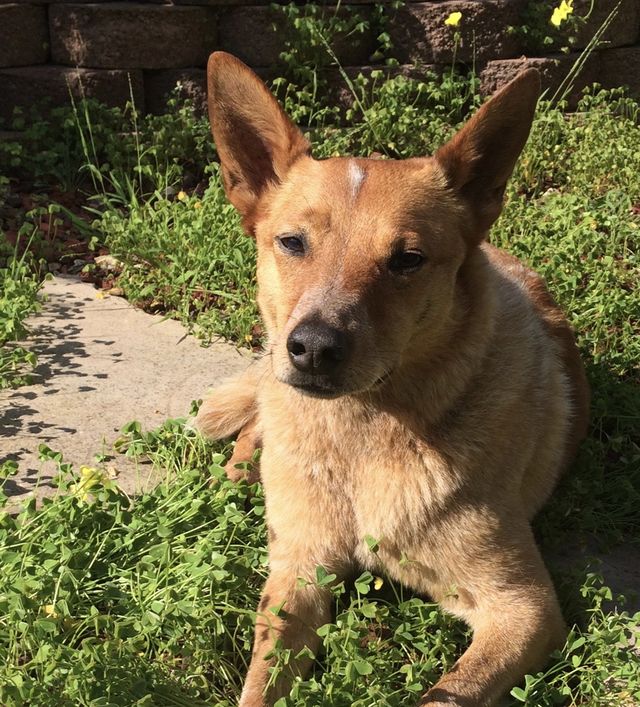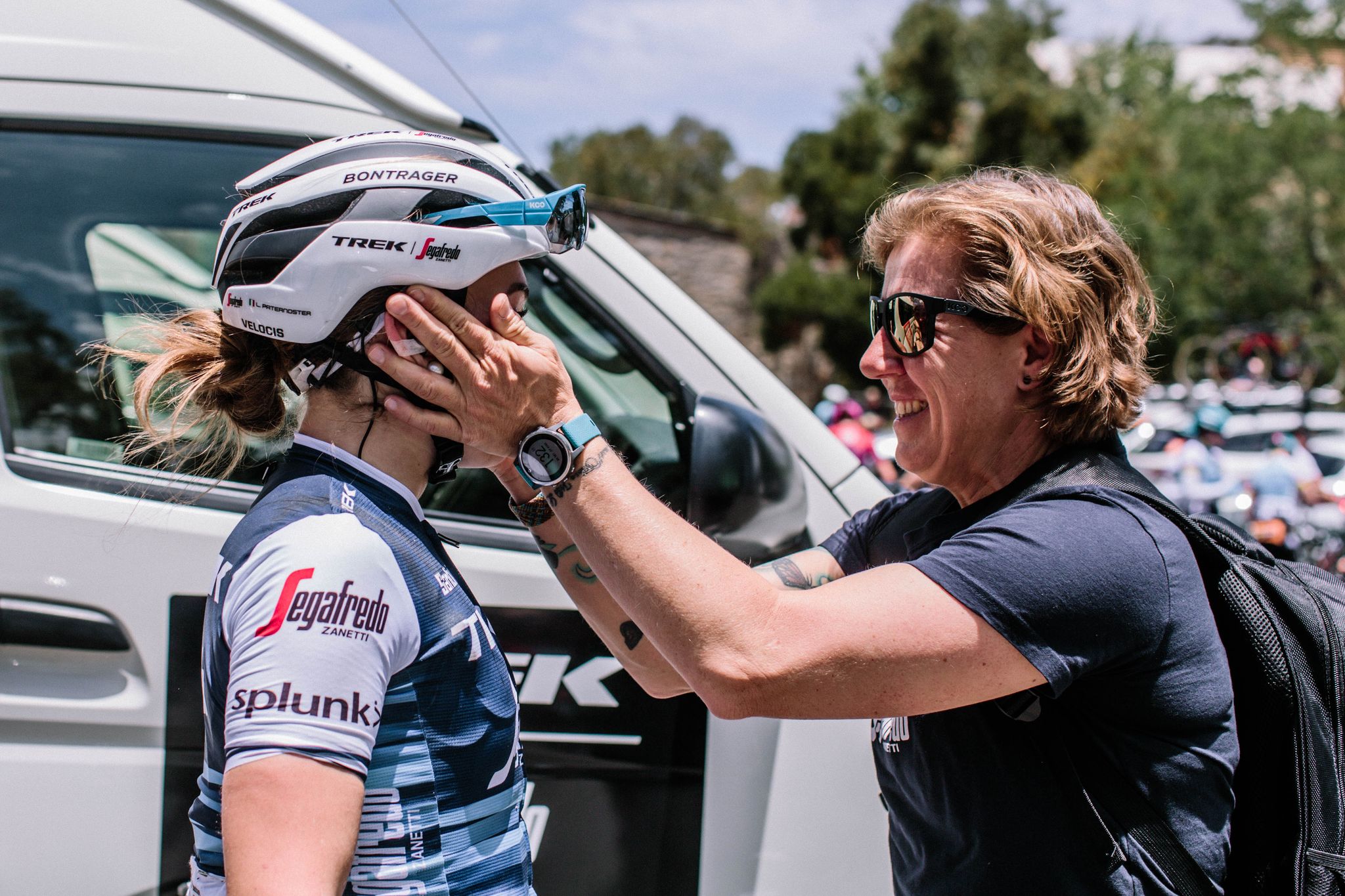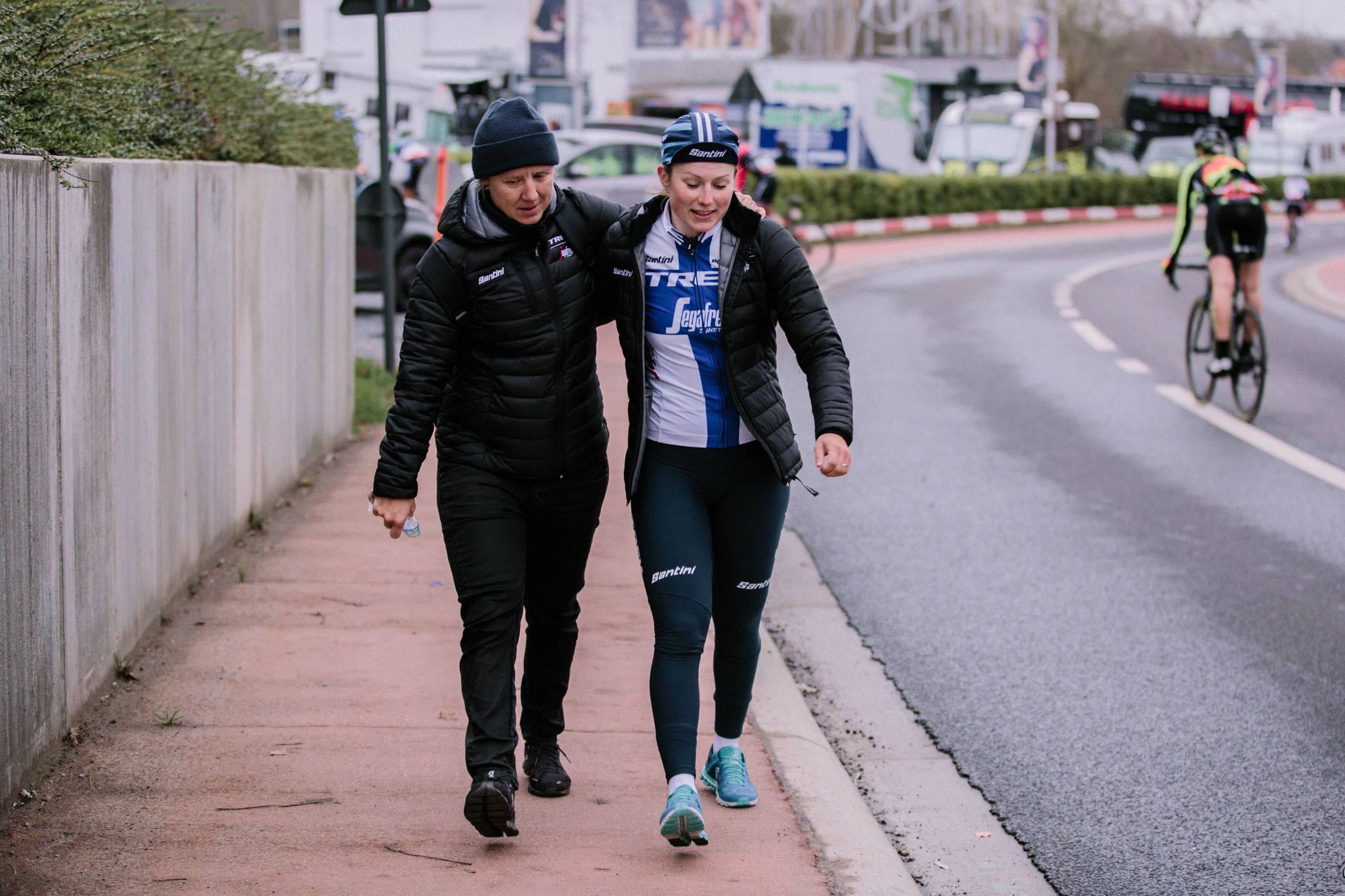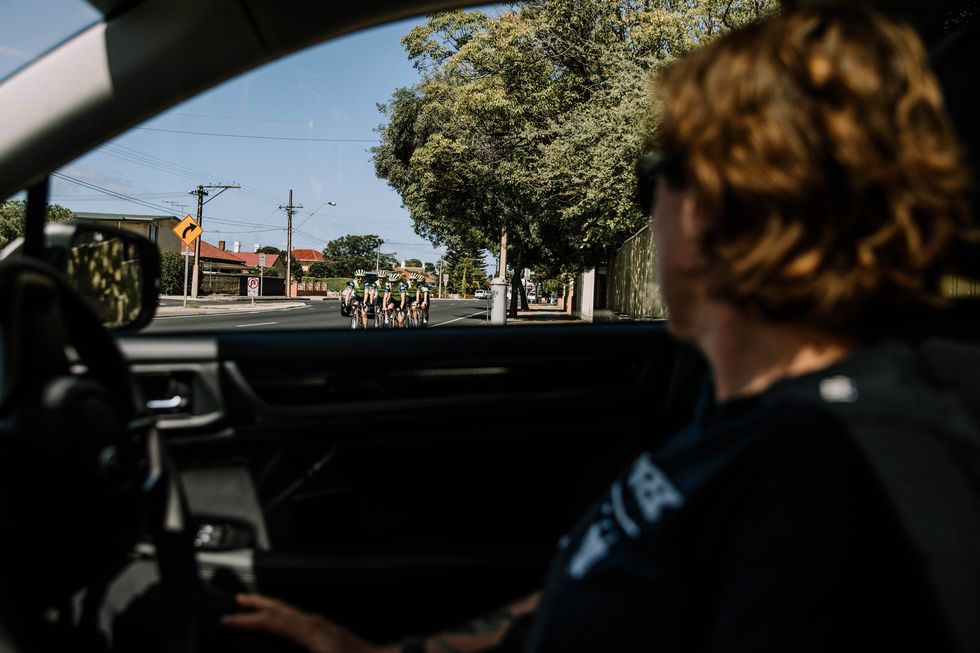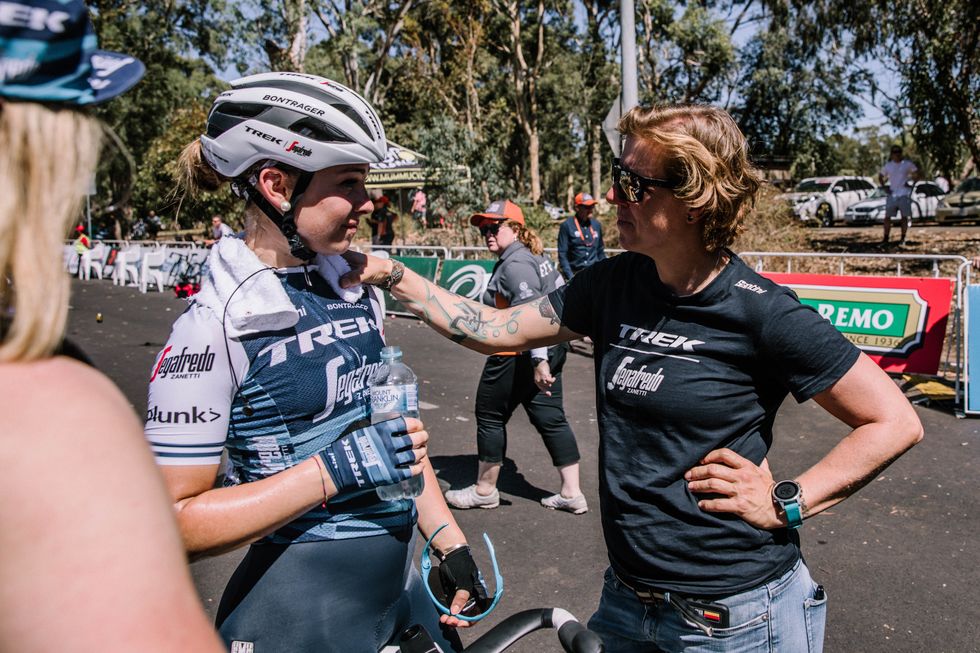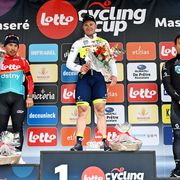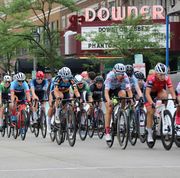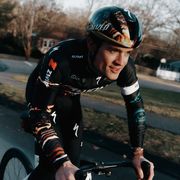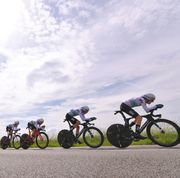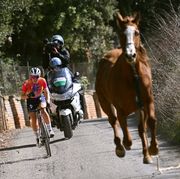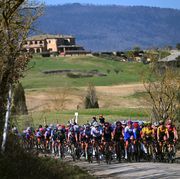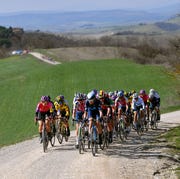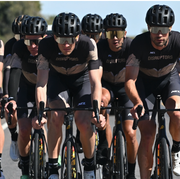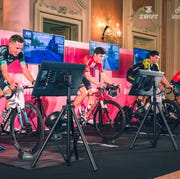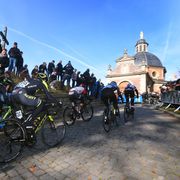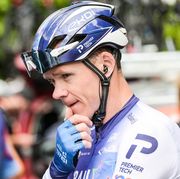They thought she was dead.
She lay face down, the left side of her face planted on the pavement, her body motionless, blood trickling from her nose. A teammate scanned frantically for help. Another rider jumped up and down, screaming, spinning her arm overhead like an ambulance beacon. Somebody shrieked, “Somebody!” Racers picked themselves up, straightened their bikes, shook off the impact. Others howled with pain. But at least they were howling. Ina was not doing anything.
Ina may wonder why this story has to open this way. She wonders why a story about her needs writing at all. That cold gray day in March 2013 at a small Dutch race called Drentse 8 van Dwingeloo should have been just another entry in one of the longest and winningest careers in professional bike racing.
In a sport where most racers lose most of the time, Ina-Yoko Teutenberg had an outsize ability to win, notching more than 200 victories in a 15-year elite career. The German powerhouse had a sprint that was hard to beat, but “her skillset in every type of racing, in every discipline, was remarkable,” says Bob Stapleton, who owned the T-Mobile and Columbia/Highroad/HTC teams on which Ina dominated from 2005 to 2011. “Her tactical knowledge was unmatched. She was probably the best individual athlete that I ever worked with, including Mark Cavendish and Tony Martin.”
And she had something else, something that few of her contemporaries possessed: an authoritative charisma that made her at once feared, admired, and beloved. “She commanded so much respect and adoration,” says pro racer Alison Tetrick. “I idolized her.” As did many who raced alongside her. Some of cycling’s biggest stars—like two-time world road champion Giorgia Bronzini and three-time Olympic gold medalist Kristin Armstrong—credit her with making them smarter, more confident racers.
“What really set Ina apart was everybody wanted to ride on the same team with her,” Stapleton says. “She elevated all her teammates in terms of their belief that they could win. She could provide a clear strategy and a clear path [to victory]. The first year we had Ina, every single athlete won a race. It set the tone for the team for the next seven years.”
Ina had already won Drentse 8 van Dwingeloo three times. Not that that meant an easy day. But looking back, she recognizes that maybe she was on autopilot that March afternoon in 2013. Before the crash, she could feel everything she understood about the circumstances of her life starting to fade, to morph into something else. She didn’t want to ride her bike and hadn’t been motivated to train in the winter months leading up to the Spring Classics. There was the existential ennui of “I’m 38 years old and have done nothing but race bikes my whole life. What am I going to do next? What is my place in the world?” Sure, she’d won a lot of races, but what did that even mean in the end?
Ina-Yoko Teutenberg would never race professionally again. But in that moment, as she lay bleeding and impossibly still, no one had any idea. No one knew that even once her visible wounds would heal, that the formidable sprinter, the tireless workhorse, the influential voice of authority, might walk away from bike racing and never look back—the unforgiving Dutch pavement depriving her of the chance to control the narrative of a remarkable career by truncating it with a profoundly disappointing finish.
The racing started early. Older brothers Sven and Lars raced bikes, and whatever they did, Ina did too. By the time she was six, she lined up for her first one. She hit the pavement almost immediately, totaling her bike and leaving a bunch of skin on the road. Unfazed, she came back the next day with her clunky townie and beat all but two in the field of mostly boys, mostly older.
The personality also started early. Ina and Sven and Lars lived with their parents, Elke and Horst, in a small town outside Düsseldorf, where Ina made her mark from the get-go. A few weeks after they moved in, when Ina was maybe four or five, a neighbor pulled Elke aside and pointed to her pixie-haired, small-for-her-age daughter dressed in her brothers’ hand-me-downs. “Watch out for that one,” the neighbor said. “That’s the worst boy in the neighborhood!”
Teachers were exasperated by her. She couldn’t abide by the stillness required to sit in a classroom. They insisted she run around outside during breaks to use up her energy. “Elementary school was pretty challenging,” she says, “probably more for my teachers than me because I was so hyper.”
The “worst boy” might have been a rabble rouser, but she had a fierce sense of justice. One year during Martinstag, a religious holiday where kids go door to door singing songs to earn candy, a group of older boys snatched the sweets Ina and her friends had collected. She was incensed. “I beat them up,” Ina laughs, remembering how it felt maybe more than how it actually happened. “Well, I stood up to them,” she admits. “I had to sing for my candy, and I don’t like singing.”
Horst was a caseworker at a government social services agency and over the years the Teutenbergs took in foster children from families in crisis. “He stood up for weaker people,” Ina says. “And I got told the truth. When you did bullshit, you were told you did bullshit. It’s just how it was.”
The family coalesced around bikes. Weekends were spent racing and the kids learned how to clean and maintain their own equipment. Elke stayed mostly behind the scenes handling the chaos at home (“I realize now how much she stepped back for us to be able to ride,” Ina says) while Horst embraced the role of coach/superfan. He encouraged hard work but took a careful approach with his talented offspring. “We were never judged about our results,” says Lars, who along with Sven, also went on to a pro career. “It was always about if we'd given our best.”
After she regained consciousness on that March 2013 day, Ina was bundled into a car and rushed to a hospital where doctors did x-rays, diagnosed a concussion and said she’d had a seizure, then sent her on her way. Though her memory of the crash is vague, when she describes falling, she slams her hand on the table—BANG!
There were no broken bones, but her face was a mess. The left side, the side that took the brunt of the impact, was bloodied and swollen and would soon turn a variety of autumnal shades. Her left eyebrow was a black gash where the frame of her Oakley Racing Jackets had dug in. Her upper lip, chin, and nose were bright red and oozing. She could hardly open her left eye, and the swelling around her mouth and cheek made for a lopsided smile in the pictures she and teammates posted on Instagram that night. It was the kind of smile that seemed to telegraph “just a setback” along with a quiet acknowledgement of how much worse it could have been.
Ina-Yoko Teutenberg could handle setbacks. She could handle suffering and pain. No one has a career like hers without the capacity to plumb excruciating depths, a capacity that resulted in a list of accomplishments most riders only dream of. Stage wins at nearly every major women’s race including the Tour de l’Aude, the Giro d’Italia Femminile, and the Route de France. The 2009 Tour of Flanders, and the overall win at the 2012 Energiewacht Tour. Two elite national road championships. Two trips to the Olympics. In the U.S., among others, she won the Redlands Bicycle Classic twice and the Philadelphia Liberty Cycling Classic five times (where in 2009 she playfully taunted the men’s peloton, calling them “pussies” after the women caught and passed them on the third lap).
Unlike many sprinters, Ina was never content to sit in and wait for the bunch sprint. “As soon as she turned up the race changed,” says Kristy Scrymgeour, a former T-Mobile manager and owner of the Specialized-lululemon team. “The action was on from the beginning.” And unlike many sprinters, she worked selflessly for her team. She counts as one of her favorite victories the World Championship team time trial with Specialized-lululemon in 2012. “She actually really cared about her teammates,” Stapleton says. “You don’t find that with people who win a lot.”
Her competitive inner drive was balanced by a gregarious exterior. “She was loud from the start line,” Scrymgeour says. “Always having fun, making jokes. Everybody loved her.” In a sport where riders often deny themselves things like wine with dinner, Ina followed her own rules. One night in a Basque Country hotel before a stage of the 2011 Emakumeen Bira, she regaled a table of reporters over several glasses of wine with a comedic rant on the absurdity of yoga. “Like, when they say ‘Find your inner castle,’ I’m like ‘Aw fuck this, you know?’”
When Ina speaks, she ends many of her thoughts with ‘you know’ and starts others with ‘I mean,’ which has the effect of making everything she says seem like something you should probably agree with. Over the years, her natural persuasiveness and magnetism earned her the nickname “boss of the peloton.” She was Horst’s daughter after all and had no problem calling bullshit for what it was. “If someone was going to talk to an official, it would be Ina,” says Stapleton. “If somebody was out of line, Ina would confront them.” At a 2005 criterium in Charlotte, North Carolina, when the race was neutralized after 10 minutes because of a mass pile-up, Ina snatched the announcer’s mic and delivered a short-but-scathing lecture to the peloton along the lines of, Everybody just needs to calm the fuck down. “I don’t even know what I said,” Ina says now. “The prize money was so big, and girls did stupid things in the first couple of laps. It didn’t make any sense.”
It wasn’t hard for Ina to recognize when things didn’t make sense, but after the crash, things stopped making sense in a way that felt unmanageable. The concussion, it turned out, had been severe, and she struggled with an unfamiliar kind of suffering. She felt disoriented. “I probably slept 18 hours every day,” she says. Her vision was disturbed and she had vertigo whenever she moved. She couldn’t tolerate noise. Going to restaurants made her head feel like it might explode. She couldn’t look at a computer screen, her phone, the TV because her eyes hurt. She couldn’t drive.
None of her once-reliable tools made a difference. There was no grabbing the mic and telling her brain to chill the fuck out. There was no demanding her candy back. She felt out of control, weak. And then there was the depression, which, if she’s being honest, had been there before the crash. “I should have taken more time away earlier in the season and faced some problems,” she admits now.
She had known the day was coming when she’d want to retire. She was tired of what she calls the “traveling circus” that’s part of being a professional bike racer. But the future was a vast empty space with no goal, no strategy, no schedule. And the past. The past seemed pointless. All those victories. What did they even mean? “I just don't think it’s important to say I was a good bike rider,” she insists. “It doesn’t really matter in the long run.”
The head injury only made it worse. “Ina was in a very dark place,” says Stapleton. “It was disturbing to see. People tend to minimize these unseen injuries, and she was an object lesson in how serious and devastating it can be.”
With anything more than a casual ride impossible, retirement seemed to be announcing itself rather than the other way around—and she made it official in a team statement seven months after the crash. “It's not the way I wanted to retire from the sport,” her statement read. “I have considered the option of racing one more season in 2014 just to be able to finish my career racing rather than due to injury, but I’ve decided it’s time now and I’m looking forward to life after racing and finding a new career.” Friends and fans couldn’t hide their disappointment. Stapleton later told Peloton Magazine, “If there was ever an athlete who deserved to go out on top, it was Ina. This is absolutely the most unfair way to end.”
When the phone call from Trek came last winter, Ina wasn’t entirely surprised. She’d heard rumblings that the Wisconsin-based bike company was planning to back a UCI Women’s WorldTour team starting in 2019. They were looking for a directeur sportif.
Trek had long sponsored a UCI ProTour men’s team, recently converting it to the factory model (in other words, company owned and operated). The women’s team, she’d heard, would be run the same way—with resources and infrastructure comparable to the men’s team. It was an unusual investment in women’s professional racing, where there’s still enough financial disparity between teams that some resort to raiding hotel breakfast buffets so they don’t have to pay for lunch. And it would afford the women the same level of professionalism that the men enjoyed, in the form of support like proper team vehicles, a dedicated chef, and enough compensation so riders could train, race, and recover without having to work a night shift somewhere.
Those kinds of resources can mean the difference between podiums and pack fodder—a tremendous opportunity for any rider who earned a contract on a team like the one Trek was backing. And a tremendous opportunity for a former champion whose path forward from retirement was still fuzzy. It was chance to be a part of something that could change the game for women’s professional road racing. A chance to turn all those victories into something that really did matter.
Still, when she got the offer to be DS of Trek-Segafredo Women, Ina wasn’t sold. It meant a return to a level of chaos she didn’t miss. Looking at her phone or laptop still made her head spin, which would be challenging in a role where administrative tasks are part of the job. She wasn’t sure her brain could handle it. Plus it would mean uprooting herself from home.
Home is a ranch house in San Luis Obispo, California, that she rents from Bob Stapleton. Home is Sophie, her 12-year-old Australian cattle dog who she loves like a child and who she credits with getting her out of bed after the crash when all she wanted to do was sleep. Home is hiking in the sunshine and running in the mountains and on the beach and bike rides with friends where she still crushes and claims Strava QOMs. Home is a kitchen table with a completed jigsaw puzzle of her adopted state of California. A refrigerator with pictures of Sophie and her family and a magnet that says “I love teamwork as long as I’m in charge.” Home is the massage studio she set up in a spare room after she got her license last year. Home is coffee in the sun on the back patio next to a lemon tree bursting with yellow fruit.
After officially retiring in October 2013, Ina had sought refuge at home. She needed a break from cycling. But what do you do when you’ve known nothing professionally besides riding your bike? She was the boss of the peloton and suddenly she was, well, what was she exactly? What was her legacy? Legacies were for people who did humanitarian work, not for people who won bike races. Was there anything else she really loved? That she could throw herself into with as much passion as she’d given cycling? “I mean, I love animals, you know,” she says. “I always say Sophie pretty much saved me.”
In late 2013 she temporarily relocated to Utah for a five-week internship at Best Friends Animal Society, where she cleaned crates, mucked stalls, walked dogs, and discovered that macaws can attack. (“I mean, they can bite your finger off!”) One internship there turned into a second, and the experience was cleansing in a way that meant she didn’t have to think about the fullness of what had come before while facing unanswered questions about what would come next. “I mean, nobody knows you ride your bike there,” she says. “It was nice to be around people who have no clue what you've done.”
Over the following few years, the answer to the question of what she would do next continued to elude her, yet somehow always led back to the bike. In the spring of 2014, with some distance from racing, Ina was ready to embrace riding again, and she joined former teammate and Canadian Olympic gold medalist Clara Hughes for two months of her ride across Canada to raise awareness for mental health. Hughes had grappled with depression after the 1996 Atlanta Olympics, and after getting some therapy herself, Ina was moved by Hughes’ effort to break the stigma around mental health by sharing her story with communities along the route.
After that, she pieced together a living via guest-directing stints with her former team, Specialized-lululemon, and with Rally Cycling and USA Cycling, where she passed along hard-earned lessons on things like when to go with your gut instead of the planned strategy. Her contribution was significant, including overall victories for Tayler Wiles at the 2014 Redlands Classic and the 2015 Tour of New Zealand, as well as gold and silver for then-juniors Chloe Dygert and Emma White in the time trial and the road race at the 2015 World Championships in Richmond, Virginia. In a post-race interview Dygert was forthright about her influence: “Ina got us the gold. She’s a tactical genius.”
But symptoms from the crash lingered. “Having so many part-time jobs in cycling was exhausting,” she says. And it wasn’t enough. “I had a lot of fun with USA Cycling, but it wasn’t satisfying. I needed to do something for myself.”
In 2015, she volunteered with Ride 2 Recovery, a program that helps rehabilitate veterans and first responders with PTSD, traumatic brain injuries, and other disabilities through cycling. She was nervous about sharing her story with participants—her injury was nothing compared to what these folks had endured. But after doing the ride with Clara Hughes and opening up to friends and family about her mental health struggles, she understood how empowering it could be. And the experience rekindled her love for cycling. For the organization’s Memorial Challenge Ride, she was paired with a blind cyclist. “It was one of the most memorable rides of my life,” she wrote afterward in an article for CyclingTips. “I communicated more than I ever have on a ride. And I realized that the bike will transform anyone who is willing to let it happen.”
Ina sits on her outdoor patio in San Luis Obispo sipping strong French press coffee. Sophie barks and wants to play an endless game of fetch. Ina wears head-to-toe black: track pants, zip-up jacket, sheepskin boots, and beanie. Mirrored Oakley Frogskins shield her eyes from an early February sun that’s not quite strong enough to warm the air. She’s just back from an early morning hike on one of her favorite local trails where Sophie (at barely 35 pounds) trotted ahead most of the way carrying a stick as big as an arm.
In the end, Ina couldn’t pass up the opportunity with Trek-Segafredo. “I mean, they have great riders and a great vision,” she says. “I was just like, ‘I’m going to have to try it.’ This is probably the best platform I’m ever going to be provided.” The team made Ina’s role public shortly after announcing 2015 World Champion and brand-new mom Lizzie Deignan as a marquee rider, making a statement about their commitment to women’s racing with the unusual move of signing an athlete in the middle of a maternity leave. “Lizzie was more interested in Trek when she found out that Ina was coming too,” says Trek sports marketing director, Tim Vanderjeugd. “That was kind of a leverage we had with riders.”
On February 13, Ina and Sophie boarded a plane from San Francisco to Frankfurt, trading the California sun for a gray German winter. Sophie curled up at Ina’s feet and zonked out for the 11-hour flight. A couple of years ago, Ina got Sophie certified as an emotional support animal so she can accompany her in the cabin instead of traveling in the cargo hold. She says it’s for the convenience but admits she couldn’t have gotten through the dark days without her. Her voice trails off when she talks about what comes next with Sophie, who was diagnosed last year with a pancreatic tumor.
They landed in Frankfurt where Ina took Sophie for a walk before catching a train to Dusseldorf where they moved into her childhood home outside the city for the 2019 season. When she was still racing, she kept her own apartment in Germany, but she’s glad to be bunking with her parents this year. Horst is now 80 and has dementia and Elke is 77. The arrangement gives Ina the chance to spend quality time with them and help around the house. She’ll be 45 this year and thinks about how there will be a day not so long from now when they won’t be around. “Even with my dad already, I mean he’s still there,” she says. “But not like the way he was.”
As she expected, some parts of her new job are more mind-numbing than others. Ina spends a lot of time making and re-making race schedules for each rider, emailing back and forth with team management, and dealing with staffing issues. Then there’s the ego managing. So far, her brain is handling it, and in late May, USA Cycling announced her appointment as Women’s Road Sports Director. In this role, she’ll oversee USA Cycling’s women’s road team at the World Championships in Yorkshire and at the 2020 Summer Olympics in Tokyo (she will recuse herself from team selection because of her job with Trek).
She’s fiercely protective of her athletes in a way that only someone familiar with the exhausting demands of pro racing can be. At a team camp last fall, she refused access to media during goal-setting meetings with riders. “The girls are shy. They won’t speak honestly in front of [outsiders],” she declared bluntly, prioritizing the riders’ well-being over an opportunity for publicity. And she’s protective of her own mental health, ceding responsibilities at some races to her co-director, Giorgia Bronzini (another coup for Trek-Segafredo), while she takes down time with Sophie and her family in Germany.
The team had a successful start in January and February with stage wins at the Tour Down Under in Australia and the Setmana Ciclista Valenciana in Spain. March and April took them to Belgium and Holland for the early Spring Classics where Ellen van Dijk won Dwaars door Vlaanderen and Audrey Cordon-Ragot won Drentse 8 van Westerveld (the Dutch race, now renamed, where Ina crashed in 2013). Deignan made her debut at the Ardennes Classics in late April, where the team rode aggressively and Deignan raced to 7th place in Belgium’s Liège-Bastogne-Liège, pretty remarkable for a rider coming off maternity leave.
The team scored their first UCI Women’s WorldTour victory in late May when Elisa Longo-Borghini won the overall at Spain’s Emakumeen Bira stage race. Deignan continued the momentum the following month with the overall victory at the OVO Energy Women’s Tour in the U.K., and the team won the Postnord Vårgårda WestSweden team time trial.
At races, Ina is in her element. It’s about instilling confidence in the riders, reviewing strategy at the pre-race meeting, then revising it from the team car as the action unfolds in real time on the road. “It’s not really rocket science back there,” she says. “The thing is, you can only have a plan, but things change.”
These days she’s at peace with the idea that things change, and she tries not to look too far ahead. She likes to joke now that her racing career was bookended by crashes, and she has no regrets about how the last one transformed the trajectory of her retirement from professional cycling. “It’s really not a negative thing,” she says, recognizing how it forced her to reckon with the inevitable. “If the sport would have lost her,” says Stapleton, “that would have been the tragedy.”
On the patio outside her home in the sunshine next to the lemon tree, Ina wonders aloud why a story about her needs writing. “I mean, it’s about the girls now; it’s not about me.” There’s truth to that. Sure. For Ina, it’s always been about the team. But hers is a story of how there’s only so much you can control about the way your life unfolds. And it’s a story of how sometimes you can persevere through the darkness and arrive at a place where you illuminate the future with everything that came before, even if you believe none of it matters.
